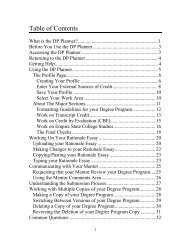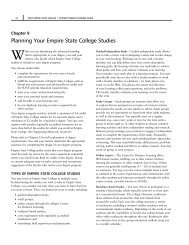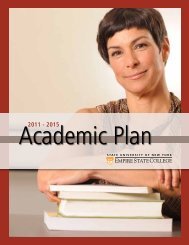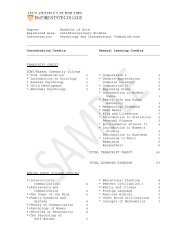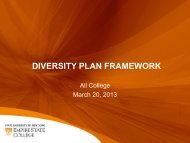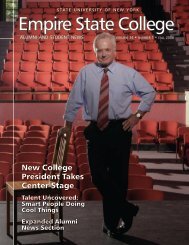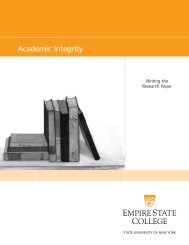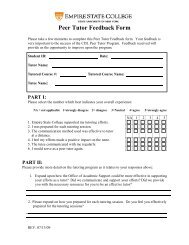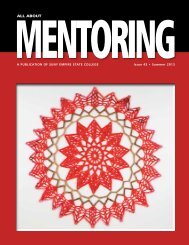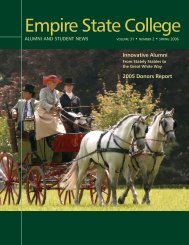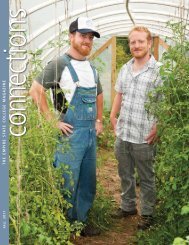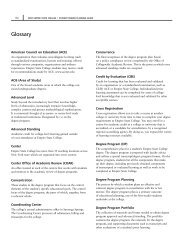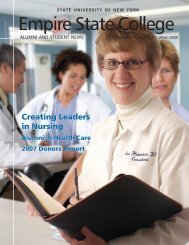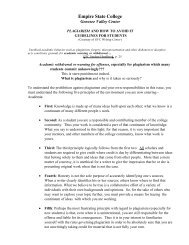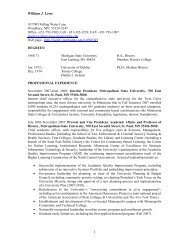All About Mentoring Spring 2011 - SUNY Empire State College
All About Mentoring Spring 2011 - SUNY Empire State College
All About Mentoring Spring 2011 - SUNY Empire State College
You also want an ePaper? Increase the reach of your titles
YUMPU automatically turns print PDFs into web optimized ePapers that Google loves.
18<br />
to educate students in ethical approaches<br />
to the repurposing, creation and sharing<br />
of content.<br />
VI. Epilogue<br />
On February 11, <strong>2011</strong>, I sat next to our<br />
colleague, Nazik Roufaiel, a native of Egypt,<br />
at the New Mentor Orientation in Latham,<br />
N.Y. We watched Arabic broadcasts on the<br />
Al Jazeera Network in real time as historical<br />
events unfolded in Cairo. As we viewed the<br />
live video stream of protesters demanding<br />
the resignation of President Hosni Mubarak,<br />
ongoing updates popped up on my iPhone<br />
from The New York Times, CNN, BBC,<br />
Reuters, Le Monde, and other news sources.<br />
Colleagues from all over the world were<br />
commenting on the events on Facebook, and<br />
my Twitter feed filled with instantaneous<br />
accounts of the live happenings. Social and<br />
mobile media were not only purveyors of<br />
news to those of us watching from afar. In a<br />
mashable article titled “Egyptian President<br />
Steps Down Amidst Groundbreaking<br />
Digital Revolution,” Emily Banks (<strong>2011</strong>)<br />
commented on the role of social media in<br />
the revolution:<br />
From the beginning, the revolution<br />
in Egypt was propelled by the use of<br />
social media. It at least partly began<br />
on Facebook with the creation of<br />
Facebook groups that gained hundreds<br />
of thousands of members and promoted<br />
the early protests in Cairo. Subsequently,<br />
the government blocked Facebook and<br />
Twitter and eventually shut down Internet<br />
access completely. And with the outside<br />
world following the unfolding revolution<br />
online, political leaders and others,<br />
including Twitter, spoke out against the<br />
violence and freedom of expression issues<br />
at risk. (p. 1)<br />
Later that day, a colleague commented that<br />
he was a little perturbed that one of his<br />
new mentees had delivered the first draft<br />
of his degree program rationale via iPhone.<br />
Meanwhile, a student taking mobile media<br />
studies shared his new blog, with an analysis<br />
of several mobile applications, before<br />
even completing his first reflection for the<br />
study. It seems that some of our students<br />
are already embracing the tools underlying<br />
digital and social media literacy.<br />
The college’s Vision 2015 includes the<br />
following social mandate:<br />
Our mission is to provide education<br />
to people who are actively engaged in<br />
sustaining and seeking to improve a<br />
challenging, diverse and problematic<br />
world. Our role as a public institution<br />
is not separate from our citizenship<br />
in the same world that challenges our<br />
learners. We must endeavor to provide<br />
the education they need to thrive as<br />
individuals, as members of communities,<br />
as active citizens and as agents for change.<br />
(p. 4)<br />
I invite you to consider this statement in<br />
alignment with Hobbs’s (2010) comment<br />
on the role of digital and media literacy in<br />
education:<br />
Digital and media literacy education<br />
offers the potential to maximize what<br />
we value most about the empowering<br />
characteristics of media and technology,<br />
while minimizing its negative dimensions.<br />
As the Knight Commission report,<br />
Informing Communities: Sustaining<br />
Democracy in the Digital Age, explains,<br />
informed and engaged communities need<br />
citizens who appreciate the values of<br />
transparency, inclusion, participation,<br />
empowerment, and the common pursuit<br />
of the public interest. (p. xi)<br />
I propose that educating ourselves and our<br />
students for digital and media literacy is an<br />
important aspect of effective teaching and<br />
mentoring for 21st century citizenship.<br />
Notes<br />
1<br />
Leads by total June to November<br />
2010. Internal data report on potential<br />
applicant inquiries by center and by<br />
discipline. This information is based<br />
on an analysis of prospective student<br />
inquiries, for the period from June 1,<br />
2010 through November 30, 2010. It<br />
was generated by the college’s office<br />
of Admissions, <strong>SUNY</strong> <strong>Empire</strong> <strong>State</strong><br />
<strong>College</strong>, Saratoga <strong>Spring</strong>s, NY, <strong>2011</strong><br />
2<br />
University of Houston, Digital<br />
Storytelling Rubric, retrieved April<br />
5, <strong>2011</strong>. http://digitalstorytelling.coe.<br />
uh.edu/DS-Project-Guidelines-2010.<br />
html<br />
3<br />
Linden Lab, “Second Life Community<br />
Standards,” http://secondlife.com/<br />
corporate/cs.php. San Francisco, CA:<br />
Accessed April 1, <strong>2011</strong>.<br />
4<br />
Assets include data provided,<br />
photographs and other images,<br />
documents and written content, and<br />
any media or digital artifact created and<br />
uploaded by the user.<br />
References<br />
Banks, E. (<strong>2011</strong>, February 11). Egyptian<br />
president steps down amidst<br />
groundbreaking digital revolution.<br />
CNN. Mashable. Retrieved from http://<br />
www.cnn.com/<strong>2011</strong>/TECH/social.<br />
media/02/11/egyptian.president.digital.<br />
mashable/index.html<br />
Brodkin, J. (2009, December 8). Facebook<br />
halts Beacon: Gives $9.5 million to<br />
settle lawsuit. PC World. Retrieved<br />
from http://www.pcworld.com/<br />
article/184029/facebook_halts_beacon_<br />
gives_95m_to_settle_lawsuit.html<br />
Goggin, G. (2008). Mobile Technologies:<br />
From Telecommunication to Media.<br />
London: Routledge.<br />
Hobbs, R. (2010). Digital and Media<br />
Literacy: A Plan of Action. In The<br />
Aspen Institute (Eds.), The Aspen<br />
Institute Communications and Society<br />
Program. Washington, DC: The Aspen<br />
Institute.<br />
Johnson, L., Levine, A., Smith, R., &<br />
Stone, S. (2010). The 2010 Horizon<br />
Report. Austin, TX: The New Media<br />
Consortium.<br />
Johnson, L., Smith, R., Willis, H., Levine,<br />
A., & Haywood, K. (<strong>2011</strong>). The <strong>2011</strong><br />
Horizon Report. Austin, TX: The New<br />
Media Consortium.<br />
Linden Lab. (n.d.). Second Life Community<br />
Standards. Retrieved from http://<br />
secondlife.com/corporate/cs.php<br />
Lyotard, J.F. (1984). The Postmodern<br />
Condition: A Report on Knowledge,<br />
Theory and History of Literature (V.<br />
10). Minneapolis, MN: University of<br />
Minnesota Press.<br />
suny empire state college • all about mentoring • issue 39 • spring <strong>2011</strong>



